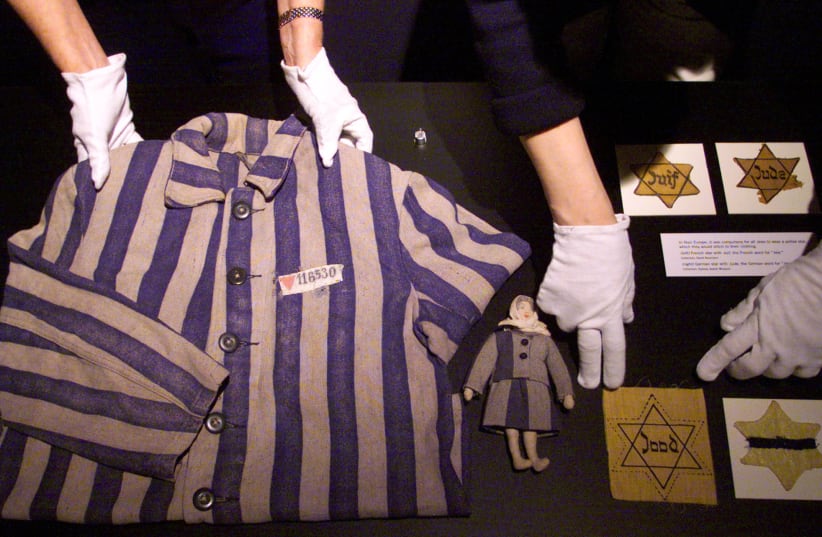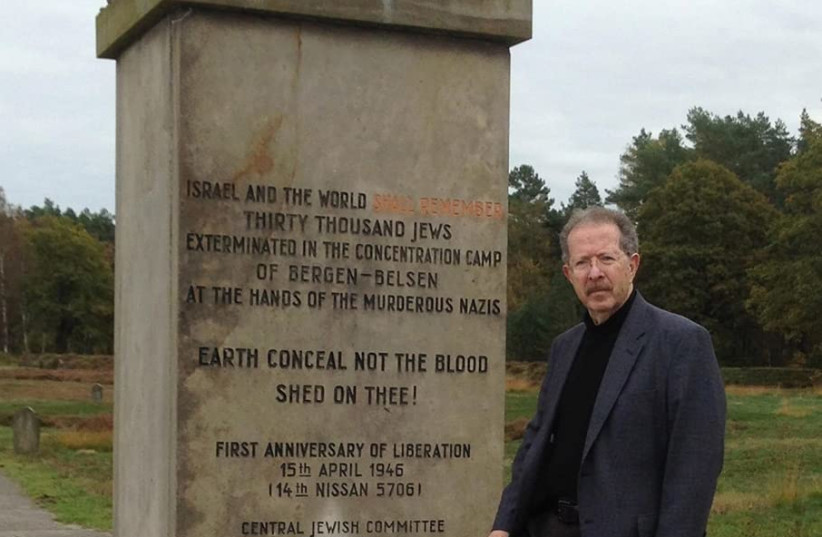In honor of the 76th anniversary of liberation: April 15, 1945.
Theodor Adorno famously wrote “To write poetry after Auschwitz is barbaric.” And yet, poetry has been written, even Nobel Prize-winning poetry (by Nelly Sachs), and poetry must be written if words are to be used to grapple with the unique evil that was Auschwitz.
But Adorno was right in some respects. The task of using language – concise language, precise language, intense language, suggestive language, allegorical language – to confront the abyss must not be undertaken lightly. It requires skill, understanding, empathy. The journey into barbarism can indeed become barbaric, yet it need not be.
Menachem Rosensaft, a second-generation survivor leader, exemplifies how to strike that balance. Rosensaft was born in the Displaced Persons Camp of Bergen-Belsen to parents who had survived Auschwitz. His mother preserved the lives of many children at Bergen-Belsen, and his father was a prominent, charismatic political leader in the DP camps who restored dignity to the survivors while making them an important symbol of need for a Jewish state. Living up to his parents’ incredible legacy is not easy, made ever more difficult by being named “Menachem,” named for his grandfather but a consolation for Benjamin, his five-year-old brother he never knew, who was taken to the crematoria at Birkenau.
Rosensaft, known as a political activist and human rights advocate, is now general counsel for the World Jewish Congress. But one would be surprised to discover that he is a poet by night, whose fierce writing wrestles with the darkness again and again. His newest work, Poems Born in Bergen-Belsen, reveals something essential about his own existence: although he left Bergen-Belsen, Bergen-Belsen has never left him.
Liberated 76 years ago on April 15, 1945, by the British, Bergen-Belsen was overwhelmingly a place of death. So virulent was the typhus epidemic there that 13,000 died after liberation and the concentration camp had to be burned to the ground – but only after its corpses were bulldozed into mass graves. But Bergen-Belsen was also a place of life, born and reborn. Rosensaft’s parents, who both had spouses that were murdered in Auschwitz, remarried and dared bring new life into the world, still not knowing where they would live and the shape of the world in which they would bring their children.
He writes of the second generation:
True, we are the childrenof a nocturnal twilightthe heir of Auschwitz and Ponarbut ours is also the rainbowin us the storm meets sunlightto create new colorsas we add defiant sparksto an eternal fireHis words challenge God and humanity, Christianity and creation. His credo:
I BELIEVEYes, I believe thatJesus was God’s childone son – not The.nor His eldestnor His heir;and murdering a manis still a greater crimethan deicideGenesis, Post Scriptumand on the eighth daythe devil became masterof the universeby creating man’s soulin God’s imageThere is anger in Rosensaft’s poetry, an anger most reminiscent of the early writing of survivors, before they were tempered by the blessings of life renewed – children and grandchildren, careers, accomplishments, love – and before they learned that to bear witness they could neither scream nor remain mute, but speak and write with a gentle fierceness or a fierce gentleness.
Rosensaft wrestles with God and appreciates the paradox that even after Auschwitz, Jews, believers, heretics and skeptics continue the traditions of Israel – wrestling with God.
Meditationthe miracleafter god did not respondto cries from the depths of Auschwitzis that Jewscontinue to praydespite AuschwitzAnd yet there is hope, not the innocent, simplistic hope of Anne Frank’s diary, completed before she died of typhus at Bergen-Belsen. But a defiant hope, that even while confronting and understanding evil, is determined not to give death and destruction the final word. Rosensaft writes:blessed is the soulthat emerged from Auschwitz and Bergen-Belsento create hopenot fearsto teach lifenot sorrow But what is wonderful in Rosensaft’s writing is that he fights intensely for Jewish rights – but not exclusively. He defends the uniqueness of the Holocaust, not to place it on the mountain top as the Olympus of suffering and evil, but to use it as a spiritual push to be sensitive to all suffering and all evil. The concluding poem of the book was written after the past summer and speaks to the extinguished life of George Floyd.Black Lives Matter of course Black lives matterand if we wantusany of usto rememberJewish lives extinguished at AuschwitzBosniak lives at SrebrenicaTutsi lives in ButareSerbian lives at JasenovacArmenian lives at Musa DaghFur lives in DarfurRohingya lives in Myanmarthen we must now all shoutthat Black lives matteruntil no child of God ever again dies gasping“I can’t breathe”Survivors and the best of their descendants often embody simple truth, basic values that form the core of human decency. Contrary to the Messianic pretentions of apocalyptic violence against their Arab neighbors, Rosensaft’s vision is infused with a commitment to the sanctity of all human life.The Messiah Will Not Comethe messiah will not comeGod will not leave Her seclusionuntil Jerusalem’s beardedrabbis imams prieststeach daily that eachJewish childPalestinian infantis created with oneonly onealways the samedivine sparkFrom the pen of a sophisticated man comes a plea for simple truths that should be – must be – at the core of all true religions. In this slim but moving volume, we can witness an encounter with barbarity and its memory that does not descend but ascends. It uses language to enrich, enhance and inspire.
POEMS BORN IN BERGEN-BELSENBy Menachem Z. RosensaftKelsay Books122 pages; 18.50

